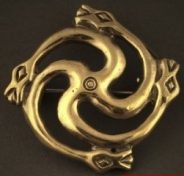While quite a lot is known about the chief gods of the sky and earth, the water gods remain a bit of a mystery. There are many lesser or “local” water deities and gods living in a certain river or lake. But who is a supreme water god is still debatable. Most likely he had different names and now we know him as Bangpūtys, Bardaitis (Gardaitis) and Vėjopatis.
Bangpūtys is a god of the sea, storms and winds. He has a beard, wings and two faces. Bangpūtys is a father of the main gods of wind: Rytys, Pietys, Šiaurys and Vakaris (easterly, southern, northern and westerly).
He is a rather vengeful god and it is difficult to reason with him. Still seafarers tried to please him by burning a wooden spoon for him. They would also go for a swim and fry the first pike in Bangpūtys honour. Fishermen would put rowan branches to their nets for protection from Bangpūtys.
Even nowadays a ritual to honour Bangpūtys is performed during an annual festival called The Smelt of Palanga (Palangos stinta). Palanga is a small town near the seaside becoming the main holiday destination during summer. The villagers believe that Bangpūtys ordered his son Stintenis (Eng. Smelty) to be a patron of the smelts festival. They made an idol of an amber smelt which hangs on the wall in one of the cafes (Smelt Order Castle). If you touch the amber smelt, you will be lucky in fishing the whole year.
Bangpūtys has also inspired Baltic Vikings to name their ship in his honour. They provide Viking ship tours in the capital of Lithuania Vilnius.
Bardaitis or Gardaitis is a Prussian god of seafaring and a patron of fishermen and ships (Gardaitis may be derived from a word “garda” (ship)). Fish were sacrificed to him. He may sound different from Bangpūtys, however he was also described as a huge bearded angel (meaning with wings), standing in the sea and controlling the winds and flocks of fish.
Vėjopatis is a god of the seas and “dausos” (Lithuanian equivalent of paradise). His name can be translated as “the lord of winds” (Lith. Vėjo pats (from Viešpats)). He is described exactly like Bangpūtys (bearded, two-faced god with wings). Maybe two faces symbolise two spheres Vėjopatis is responsible for – water and air. Vėjopatis is also strict and vengeful, particularly to those who enter his domain. It is believed he blows the unworthy away from the paradise gate.
While our ancestors tried to please or even feared the raging god, nowadays he inspired a music project called Vėjopatis, where contemporary electronic vibes meet mystical Baltic mythology.




